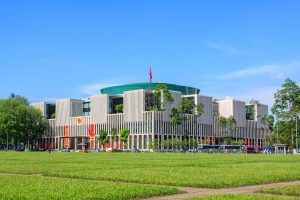These are tumultuous – perhaps unprecedented – times in Vietnamese politics. Yesterday, Reuters reported that the country’s National Assembly will hold a rare extraordinary meeting tomorrow, to consider more high-ranking personnel changes. Citing three sources familiar with government and parliament affairs, the report stated that the legislature “may ratify resignations of more high-ranking officials,” in Reuters’ paraphrase.
The meeting would follow a similar extraordinary gathering on January 5, when two deputy prime ministers were dismissed, seemingly in connection with a spate of high-level corruption scandals. One of those was Pham Binh Minh, who served as the country’s foreign minister between 2011 and 2021 and as a deputy prime minister since 2013, and was also a member of the Politburo, the Communist Party of Vietnam (CPV)’s apex decision-making body.
The Reuters report comes amid persistent social media rumors that President Nguyen Xuan Phuc, who took up his post in 2021 after one five-year term as prime minister, could be the next to fall.
According to a recent article by Le Hong Hiep of Singapore’s ISEAS-Yusof Ishak Institute, Phuc may have already been handed his “red card” by the CPV. Hiep claims that during a secret meeting on January 13, the Politburo quietly voted to oust him from his position as president. If this eventuates, he would become the first Vietnamese president to be ousted while still in office.
The rash of high-level personnel changes is almost certainly related to a string of high-level – and for the CPV, highly embarrassing – corruption scandals. Minh seems to have been dismissed for his part in the so-called repatriation scandal, in which stranded Vietnamese citizens were charged eye-watering fees – essentially bribes – in order to gain seats on government-organized repatriation flights. The scandal has resulted in the prosecution of 40 government officials, senior diplomats, and businesspeople, and the CPV’s formal censure of the current foreign minister, Bui Thanh Son.
Dam, meanwhile, is connected to the Viet A graft scandal, which involved corruption in the procurement of COVID-19 test kids, and which by last month had led to the prosecution of 102 people, including two former ministers.
Indeed, these defenestrations, and the possible removal of Phuc, seem to represent something of an apotheosis for CPV chief Nguyen Phu Trong’s “blazing furnace” anti-corruption campaign. Now nearly a decade old, the campaign has swung through Vietnamese public life like a scythe, resulting in the prosecutions of hundreds of senior officials and prominent businesspeople. Indeed, the campaign has now reportedly paralyzed the Vietnamese bureaucracy, such is officials’ fear of being entangled in anti-corruption investigations.
However, fighting corruption – and seeking to rehabilitate the CPV’s image in the eyes of the Vietnamese public – is clearly only one part of the story. One figure who very pointedly hasn’t fallen on his sword is Minister of Public Security To Lam, who in late 2021 was captured on video eating a gold-encrusted steak at a London restaurant owned by a ludicrous Turkish celebrity chef Salt Bae. Once the video hit social media, it sparked a considerable public outcry; one noodle vendor was later arrested for “anti-state” acts after he posted a video on social media imitating Salt Bae’s flamboyant gestures – an act that the state recognized as a clear mockery of the powerful official.
The reason that that Lam has survived the scrutiny of the anti-corruption authorities – the gilded steak cost him around $1,000, more than his official monthly salary –s may be connected in some way to the fact that Lam has been rumored as a possible replacement for Phuc, should the latter indeed be shown the exit in the coming days. As Hiep writes, Lam “seems to have gained Trong’s trust for his loyalty and important role in directing anti-corruption probes.” The fact that he could soon be one of Vietnam’s four most powerful leaders merely reinforces that corruption is not, if it ever has been, the only motivation behind Trong’s anti-corruption campaign.
The prominent Vietnam-watcher Bill Hayton described the current upheaval to the assertion of Trong’s authority – and by extension, that of the CPV – comparing it to the consolidation of power that has taken place in China under Xi Jinping: “This is Mr Trong’s Communist Party and its tool, the Ministry of Public Security, taking back power from those who think the Government should run policy.” As Hayton added, none of this bodes well for a marginally more tolerant or open political sphere. “If the rumors hold up,” he wrote.,“Vietnam will have both a president (To Lam) and a prime minister (Pham Minh Chinh) from the Ministry of Public Security. That is not good.”

































